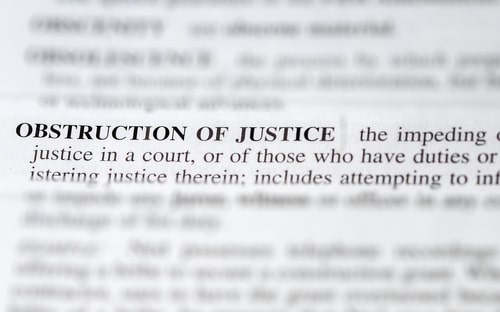“Doug & Chris are top notch. Both are extremely competent, family oriented and deliver results.”-D.P.
What is Obstruction of the Federal Justice System?
 Obstruction of justice at the federal level is extremely serious in all its forms. The term "obstruction of justice" is an umbrella term that refers to a lot of different specific offenses. Just like the term "drug crime" might refer to possession of cannabis without a medical license, distribution of cocaine, or trafficking heroin into the country, "obstructing justice" might refer to tampering with a witness, influencing a juror, or a host of other offenses. Generally speaking, obstruction of justice means making any attempt to stop law enforcement or the courts from carrying out their duties in accordance with the law. If you are charged with obstructing justice at the federal level, you need an experienced Houston, TX federal crimes attorney.
Obstruction of justice at the federal level is extremely serious in all its forms. The term "obstruction of justice" is an umbrella term that refers to a lot of different specific offenses. Just like the term "drug crime" might refer to possession of cannabis without a medical license, distribution of cocaine, or trafficking heroin into the country, "obstructing justice" might refer to tampering with a witness, influencing a juror, or a host of other offenses. Generally speaking, obstruction of justice means making any attempt to stop law enforcement or the courts from carrying out their duties in accordance with the law. If you are charged with obstructing justice at the federal level, you need an experienced Houston, TX federal crimes attorney.
Types of Federal Obstruction of Justice Offenses
Most people who are suspected of a crime make some attempt to avoid arrest, but few are charged with obstruction-related offenses. Some of the crimes that fall under the umbrella of obstruction of justice include:
-
Tampering with a witness, victim, or informant - Threatening, bribing, attempting to kill, kidnapping, or blackmailing any person who may testify against you or provide information about your crime to law enforcement is a crime. Retaliating against any of these individuals after they have already testified or provided information is a separate offense.
-
Stealing, altering, or falsifying court records - This includes attempts to destroy evidence against you that is in the court or prosecutor’s possession. This offense is sometimes committed electronically by attempting to hack into the court’s computer system to alter information regarding your case.
-
Influencing a juror - Trying to convince a juror to vote not guilty in any way (except by lawful means during your trial) is illegal. This may include threatening or bribing a juror.
-
Picketing or parading - This offense can be difficult to distinguish from lawful demonstrations. Picketing or parading outside a courthouse with the intent of influencing a judge or stopping court proceedings is illegal. However, some orderly protests near courthouses can be legal. Always consult an attorney if you are planning any type of demonstration relating to a criminal case near a courthouse.
-
Falsifying, destroying, or concealing evidence - Trying to hide, destroy, or alter any records or other physical pieces of evidence to stop law enforcement from finding them during a lawful search is a criminal offense. This includes, for example, a corporate financial executive shredding business records that contain evidence of a financial crime.
Contact a Houston, TX Federal Obstruction of Justice Lawyer
Murphy & McKinney Law Firm, P.C. is skilled in protecting the rights of those charged with federal crimes. Experienced Harris County, TX federal obstruction of justice attorney Doug Murphy will fight to defend you. Contact us at 713-229-8333 for a complimentary consultation.




 Office Location
Office Location
